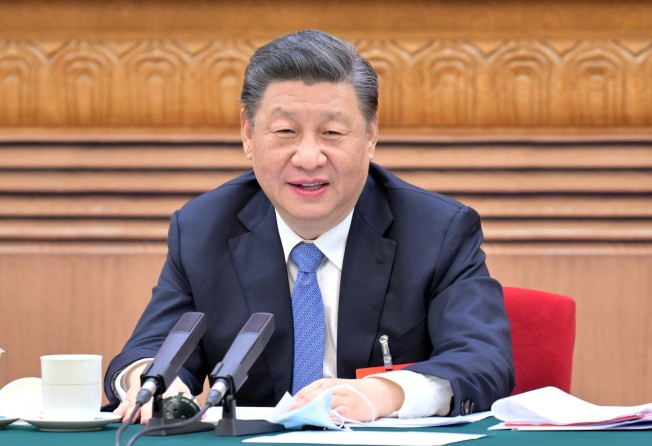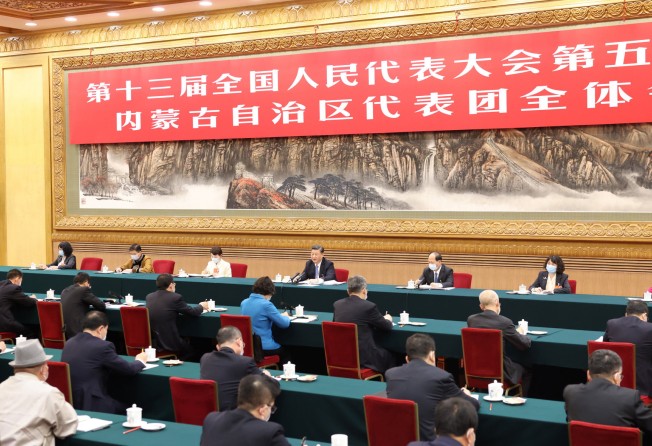Xi Jinping calls for China’s ethnic groups to ‘stick together like pomegranate seeds’
- Speaking to Inner Mongolians at the annual legislative meeting, Chinese leader says unity is necessary to build the country
- He also tells them they have a responsibility to maintain border stability and urges coordinated efforts to control Covid-19

President Xi Jinping has told Inner Mongolian deputies at the country’s annual legislative session that unity is the “lifeline” for all ethnic groups in China, calling on them to “stick together like pomegranate seeds”.
Speaking on Saturday, Xi said unity was necessary to build the country, and that the northern autonomous region had a responsibility to maintain the stability of the country’s border, according to official news agency Xinhua.
As Russia’s invasion of Ukraine continues to capture the world’s attention, China’s leaders are looking inward during the National People’s Congress in Beijing, with a heavy focus on national unity and loyalty to the ruling Communist Party – and Xi.
Delivering a cautious government report for the year on Saturday, Premier Li Keqiang put the emphasis on maintaining stability and risk control, with no mention of the United States, Europe or the Ukraine crisis.
In his discussion with the Inner Mongolian deputies, Xi called for coordinated efforts to control Covid-19, and for the region to pursue economic and social development with a green focus, while protecting energy, food and industrial security.
He also said effective measures should be taken to prevent risks in ethnic affairs and to ensure the security of China’s northern border.
The vast region borders Mongolia and is home to more than 4 million ethnic Mongolians, who make up about 17 per cent of a majority Han Chinese population.
Beijing’s decision in 2020 to expand the use of Mandarin instead of Mongolian in the region’s schools was seen by many as a bid to suppress Mongolian language and culture and led to protests and a crackdown.
China officially recognises 56 ethnic groups and grants a level of autonomy to some, but Beijing has made clear that the so-called affirmative action policies for these groups were being scaled back to promote integration into the majority Han population.
Tibet and the predominantly Muslim region of Xinjiang have also been subject to policies reducing the use of ethnic minority languages in schools, as well as crackdowns on religious practices. Beijing has been accused of human rights abuses in both regions and elsewhere.

At the Great Hall of the People this weekend, many top officials have meanwhile been using a new slogan – the “two establishments” – in meetings with provincial deputies. The slogan refers to establishing Xi’s status as China’s “core” leader and establishing his political doctrine, which was enshrined in the constitution in 2018.
Those officials included Li Zhanshu, who heads the NPC, and Wang Yang, chairman of the top political advisory body that is also meeting in Beijing. Both are also among the seven members of the powerful Politburo Standing Committee.
Vice-President Wang Qishan said the “two establishments” was the party’s most important political achievement since the 2012 national congress and that it reflected the confidence of the party and the people to explore “the path, theory, system and culture of Chinese-style modernisation”.
It was also used by Central Military Commission vice-chairman Zhang Youxia, who on Saturday called on the military delegation to firmly support the “two establishments”.
The slogan first appeared in a resolution on history that was approved by hundreds of top party officials in November and cemented Xi’s status, putting him on par with Mao Zedong and Deng Xiaoping. Since then, cadres at all levels have been using the slogan as a way to show loyalty to Xi.
Beijing’s political elite have also pledged this weekend to pave the way for the party’s national congress in autumn, a twice-a-decade event at which Xi is expected to secure an unprecedented third term in power.